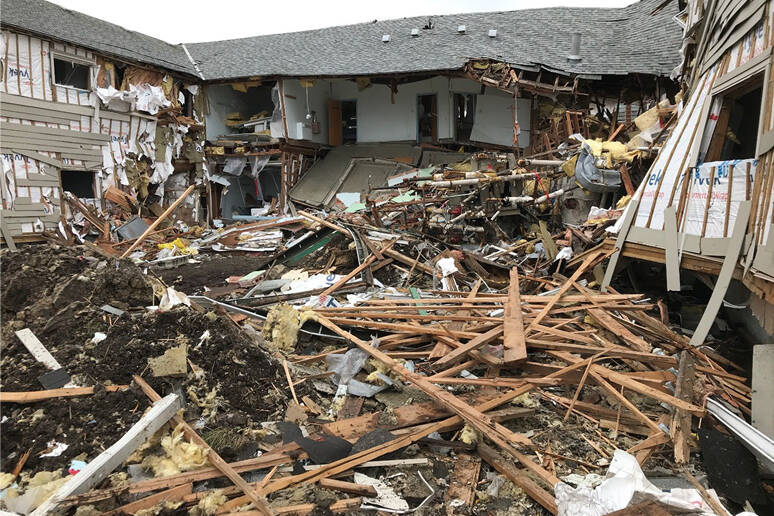Nearly a year after 28 people were injured in an explosion of a building at CFB Comox, Technical Safety BC confirmed the incident was caused due to a natural gas line that was struck.
On Nov. 18, 2021, Building 25, which was an accommodation facility, was undergoing renovations when civilian contractors who were installing perimeter drains inadvertently struck an identified gas line.
Ryan Hazlett, leader of incident investigation at Technical Safety BC (an independent organization that oversees the safe installation and operation of technical systems and equipment) was on the scene at the base days after the explosion and noted contractors did call BC 1 and hand-identified gas lines nearby.
“The door to the mechanical room (on Building 25) was removed and the gas line that was struck was feet away from the building door(frame). Gas started to accumulate in a high concentration in the building,” he explained.
According to his report, a small excavator was digging near the mechanical room at the rear of the building where it struck a 25mm natural gas line located approximately two feet below the service. Gas began escaping at 80 psi pressure in the director of the mechanical room door opening.
After speaking with someone from the fire department (whose name and department was redacted in the report), Hazlett was told the time from the first line rupture to having the natural gas line turned off was approximately 20 minutes.
He later learned from Technical Safety BC that the explosions occurred 10-15 minutes after the gas line was struck and that an individual (whose name is redacted) turned off the gas supply approximately two hours following the event.
He wrote that he assumed the second statement to be accurate.
Hazlett said while he couldn’t confirm the exact source of ignition, he added even something mundane as a pilot light, static electricity or a light switch turning on can be a source at high gas level concentrations.
While some debris had been removed and cleaned prior to Hazlett’s arrival on the scene, he found debris from the source structure and mechanical room up to 106 meters away from the location of the mechanical room.
While contractors followed the correct procedures by calling BC1, he advises additional precautions to prevent lines from being struck such as having a spotter in place and additional protections around lines.
“It helps also to asses the situations – look around and ask what could happen if I do hit a line? Is there containment? Are there people nearby? Call before you did is step one, but let’s think of what the next steps are.”
Nearly half of all gas line hits in British Columbia occur despite workers taking initial precautions such as calling BC1 before digging, added Hazlett.
photos@comoxvalleyrecord.com
Like us on Facebook and follow us on Twitter

